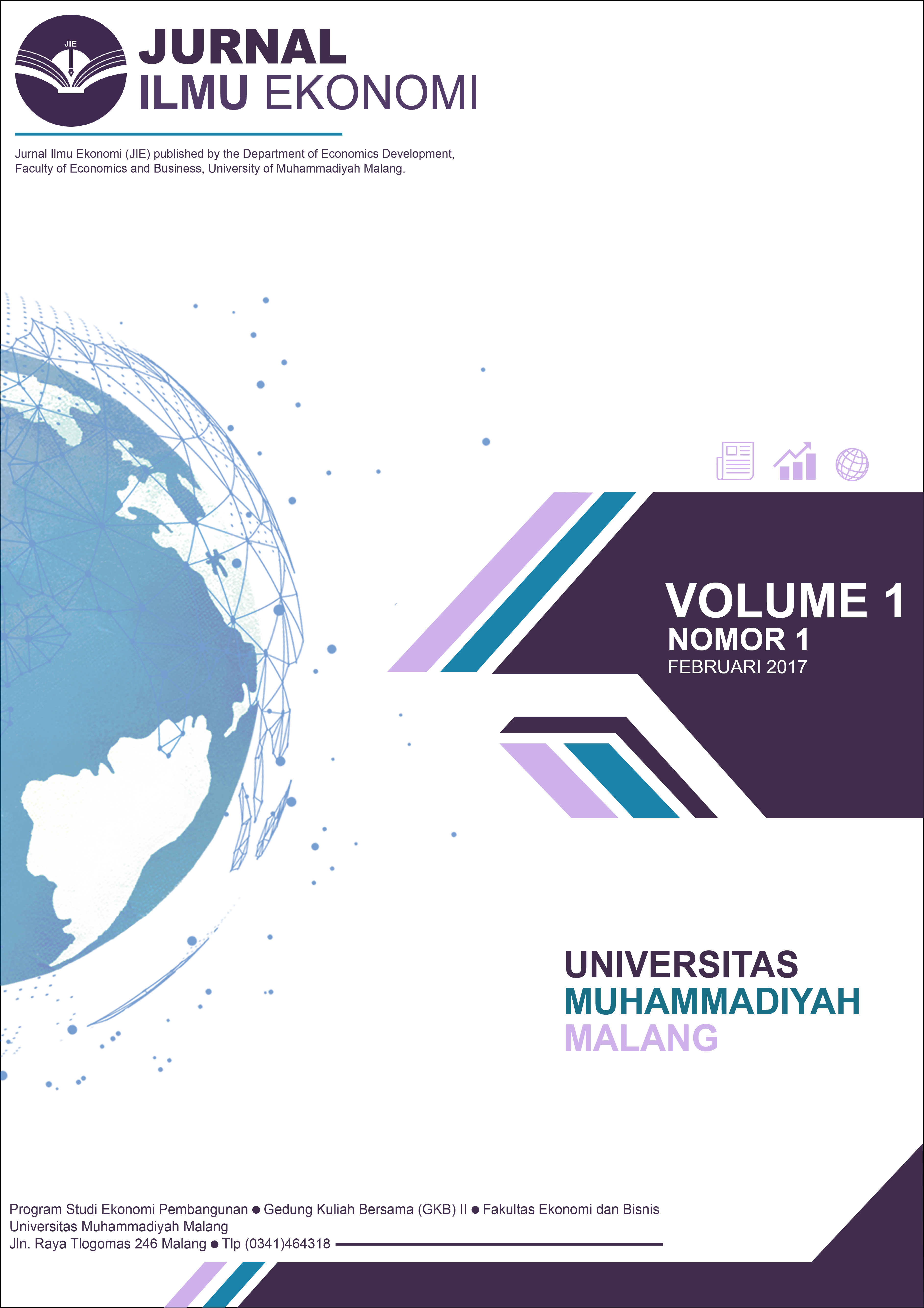FAKTOR-FAKTOR YANG MEMPENGARUHI PRODUKSI PADI DI KABUPATEN MALANG PADA TAHUN 2010-2016
DOI:
https://doi.org/10.22219/jie.v1i1.5406Abstract
This study aims to determine the influence of rice production on regency of Malang. The data collection in this research is secondary data. Data obtained from the relevant authorities, namely: Badan Pusat Statistik (BPS). The analytical tool in this study is regression panel data. The hypothesis processed by F test, t test, and the coefficient of determination (R2) at the level of error is α = 5%.The dependent variable is the independent variable of rice production and the area of land, the cost of fertilizer and labor. Based upon the results of the study show that (X1) land area of positive and significant impact on rice production (Y), (X2) fertilizer significant negative effect on rice production (Y) and labor (X3) positive and significant impact on rice production (Y).Thus the results of this study are expected to be useful in compiling the policies and strategies effectively and efficiently to the activities for increasing rice production in Malang, East Java.
Keywords: Land, Fertilizer Costs, Labor and Rice Production.
Downloads
References
Arisman. (1981). Pendidikan Ketrampilan SMTA Pertanian. Bandung: Angkasa.
BPS. (2015). Pertanian dan Perkebunan. Malang.
BPS. (2016a). Jumlah penduduk.
BPS. (2016b). Survei Pertanian Produksi Padi dan Palawija di Jawa Timur.
Badan Pusat Statistik (BPS), diakses dari http://www.bps.go.id/, diakses pada bulan Juli 2017
Cantika. (2012) IPTEK Bagi Gapoktan ”Jati Mulya” Kelurahan Jatimuyo Lowokwaru Kota Malang, Jurnal Ekonomo Pembangunan.)
Daniel, M. (2004). Pengantar Ekonomi Pertanian. Jakarta: Bumi Aksa.
Gujarati, Damodar N., dan Dawn C. Porter, 2012.“Dasar-Dasar Ekonometrika”, Edisi Lima, Buku Dua. Penerbit Salemba Empat. Jakarta
Iskandar, P. (2002). Pengantar Ekonmi Mikro da Makro. Jakarta: Ghalia Indonesia.
Mafor.2015.”Analisis faktor produksi padi sawah di desa Tompasobaru dan kecamtan Tompasobaru”. Jurnal pertanian. Universitas Sam Ratulagi.
Mubyarto. (1989). Pengantar Ekonomi Pertanian. Jakarta: LP2ES.
Mudakir, B. (2011). produkivtas Lahan dan Distribusi Pendapaatan Berdasarkan Status Pengusaan Luas Lahan Pada Usaha Tani Padi Sawah. Dinamika Ekonomi Pembangunan.
Nicholson, W. (2008). teori ekonomi mikro : prinsip dan pengembangannya. Jakarta: Raja Gafindo.
(Nuraini, I. (2011), Model Pengembangan Industri Manufaktur di Kota Malang. Jurnal Ekonomi Pembangunan.)
Nuraini, I. (2013a). Pengantar Ekonoi Mikro. Malang: UMM Pres.
Nuraini, I. (2013b). Pengantar Ekonomi Mikro. Malang: UMM Press.
Nuraini, I. (2017). Kualitas pertumbuhan ekonomi daerah Kabupaten di Jawa Timur.Jurnal Ekonomi Pembangunan.
Sukirno, Sadono. 1985. Ekonomi Pembangunan. Jakarta : LPEF-UI Bima Grafika
Sukirno, S. (2000). Makro Ekonomi Modern. Jakarta: Pt. Raja Grafindo Persada.
Suryana S.2007.”Analisis factor – faktro yang ,mempemgaruhi produksi jagung dikabupaten Blora”.Jurnal Ekonomi dan bisnis. Universitas Diponegoro.
Yusuf, A. d. H., D. (2010). Teknologi Budidaya Padi sawah. Sumatra.
Published
How to Cite
Issue
Section
License
Authors who publish with this journal agree to the following terms:
- For all articles published in the JIE (Jurnal Ilmu Ekonomi), copyright is retained by the authors. Authors give permission to the publisher to announce the work with conditions. When the manuscript is accepted for publication, the authors agree to the automatic transfer of non-exclusive publishing rights to the publisher.
- Authors retain copyright and grant the journal right of first publication with the work simultaneously licensed under a Creative Commons Attribution-NonCommercial-ShareAlike 4.0 International License that allows others to share the work with an acknowledgement of the work's authorship and initial publication in this journal.
- Authors are able to enter into separate, additional contractual arrangements for the non-exclusive distribution of the journal's published version of the work (e.g., post it to an institutional repository or publish it in a book), with an acknowledgement of its initial publication in this journal.
- Authors are permitted and encouraged to post their work online (e.g., in institutional repositories or on their website) prior to and during the submission process, as it can lead to productive exchanges, as well as earlier and greater citation of published work (See The Effect of Open Access).
This is an open access article and licensed under a Creative Commons Attribution-NonCommercial-ShareAlike 4.0 International License








